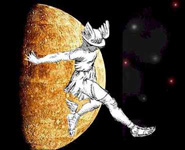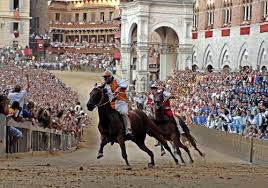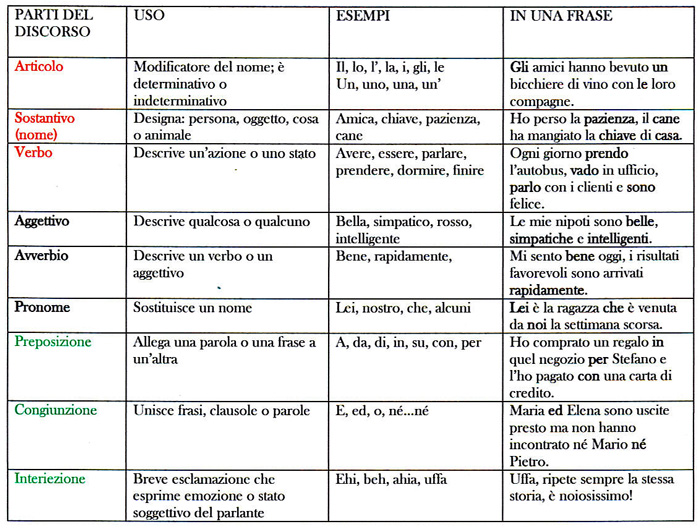

Saturday, December 27, 2014
AUGURO A TUTTI UN
I WISH YOU ALL A
Saturday, December 20, 2014
SCHERZO, BATTUTA, BARZELLETTAQueste tre parole si traducono in inglese con la stessa parola: “joke” ma
hanno significati diversi: Consideriamo questi esempi.SCHERZO:
· Non è uno scherzo, lo dico sul serio.
· Luca ha fatto uno scherzo al suo maestro, ed è finito nell’ufficio della
preside.
BATTUTA:
· Il comico faceva una battuta dopo l’altra, ma gli spettatori non
ridevano.
· Ogni tanto ci vuole una bella battuta per cambiare l’aria.
BARZELLETTA:
· Luigi ha raccontato una barzelletta su un italiano, un francese, un
tedesco e un americano, finalmente mi ha fatto ridere.
· Non mi piacciono le barzellette sporche che racconta Gianrico.
E per le prossime settimane il mio blog andrà in vacanza. Lo dico sul serio,non
scherzo mica!*******************************************************************
SCHERZO, BATTUTA, BARZELLETTA
These three words all translate into English as “joke” however they have different
meanings. Let’s consider these examples:SCHERZO:
· It’s not a joke, I’m serious.
· Luca played a joke on his teacher and ended up in the principal’s office.
BATTUTA:
· The comic told one joke after the other but the spectators didn’t laugh.
· Every once in a while a joke is needed to change the mood.
BARZELLETTA:
· Luigi told a joke about an Italian, a Frenchman, a German and an American,
he finally made me laugh.
· I don’t like the dirty jokes that Gianrico tells.
And for the next few weeks my blog is going on vacation. I’m serious, I’m
not joking!
Saturday, December 13, 2014
MOLTO, TANTO, TROPPO o POCO
Sono variabili o invariabili? Sono aggettivi, avverbi o pronomi? La risposta è:
possono essere tutti e tre. Se la parola è usata per descrivere un sostantivo o
un pronome è un aggettivo, perciò è variabile. Se sostituisce un sostantivo, è
un pronome, ed è variabile. Se modifica un aggettivo o un verbo è un avverbio,
in questo caso è invariabile.* Guardiamo a degli esempi.MOLTO:
· I bambini avevano molta fame, hanno mangiato tutta la loro cena.
(aggettivo)
· Abbiamo viaggiato molto l’anno scorso, quest’anno abbiamo deciso di
rimanere a casa. (avverbio)
· La professoressa ha insegnato parecchi corsi, ma ce ne sono ancora molti
che lei vorrebbe insegnare prima di andare in pensione. (pronome)
TANTO:
· Oggi fa tanto freddo, mettiti il cappotto e i guanti! (aggettivo)
· Barbara ha parlato tanto al telefono, infatti, ha perso la voce. (avverbio)
· Avevo invitato solo cinque amici a cena, invece ce ne sono venuti tanti di
più.(pronome)
TROPPO:
· Loretta ha bevuto troppo vino ieri sera e oggi soffre di mal ditesta.
(aggettivo)· Sergio fuma troppo, e ora che smetta. (avverbio)
· In quella libreria ci sono molti libri strani, infatti, secondo me ce ne sono
troppi che trattano dei morti viventi. (pronome)
POCO:
· Ci sono poche camere libere in quell’albergo. (aggettivo)
· Claudio ha mangiato poco, vuole dimagrire prima della festa. (avverbio)
· Ho molti amici ma sfortunatamente pochi abitano in questa città,
(proverbio)
**************************************************************
MOLTO, TANTO, TROPPO o POCO
Are they variable or invariable? Are they adjectives, adverbs or pronouns?
The answer is: they can be all three. If the word is used to describe a
noun or a pronoun it is an adjective, therefore it is variable. If it
substitutes a noun, it’s a pronoun, and it’s variable. If it modifies an
adjective or a verb it’s an adverb, in this case it’s invariable.* Let’s look
at a few examples:MOLTO:
· The children were very hungry, they ate all their supper.
· We traveled a lot last year, this year we decided to stay home.
· The professor taught many courses, there are still many she would like to
teach before she retires.
TANTO:
· Today, it is very cold, put on your coat and your gloves.
· Barbara spoke a lot on the phone; in fact she lost her voice.
· I had invited only five friends to dinner, instead many more came.
TROPPO:
· Loretta drank too much wine last night and today she has a headache.
· Sergio smokes too much, it’s time he quit.
· In that bookstore there are many odd books, in fact, in my opinion there
are too many that deal with zombies.
POCO:
· There are few free rooms in that hotel.
· Claudio ate little; he wants to lose weight before the party.
· I have many friends, unfortunately only a few live in this city.
* Vi prego di notare che i significati variano in inglese.
* Please note that the meanings vary in English.
Saturday, December 6, 2014
BRAVO O BUONO O BELLO?
Queste tre parole spesso confondono gli studenti americani perché se
Così vale la pena ripassarne l’uso.
guardano nel loro dizionario per la traduzione di “good” trovano almeno queste
possibilità.
Bravo quando è usato da aggettivo, descrive esseri viventi: persone o animali,
le loro qualità, abilità, il loro valore. Non è usato per descrivere cose
inanimate.
Gemma è una brava cuoca.
- Fido è un bravo cane.
- Alessandra e Diana sono brave studentesse.
- Cristoforo e Giacomo sono bravi pasticceri.
Buono quando è usato da aggettivo, esprime un giudizio, descrive una qualità:
Abbiamo mangiato dei buoni biscotti e bevuto del buon caffè per colazione.
- Cristina è proprio una buon’amica.
- Hanno fatto un buon affare quando hanno comprato quella casa in città.
- Questo sciroppo è buono per la tosse.
Bello è un aggettivo che descrive un aspetto estetico di un sostantivo o
esprime un giudizio positivo. Ricordiamoci che qui stiamo parlando della
traduzione a “good” in inglese, non a “beautiful”.
- Ieri ho visto un bel film.
- Leggiamo delle belle novelle di Luigi Pirandello in classe.
E della parola bene? Ne parleremo un’altra volta.
_________________________________________________________________
These three words often confuse American students because if they look up
the translation for “good” in their dictionaries they will find at least these
possibilities: bravo, buono, or bello. Therefore, it’s a good idea to review their
uses.Bravo when it is used as an adjective describes living things: persons or
animals. It is not used to describe inanimate objects.Gemma is a good cook.
- Fido is a good dog.
- Alessandra and Diana are good students.
- Cristoforo and Giacomo are good bakers.
Buono when it is used as an adjective expresses a judgment or describes a
quality.
- We ate good cookies and drank good coffee for breakfast.
- Cristina is really a good friend.
- They made a good deal when the bought that house in town.
- This cough syrup is really good (for coughs).
Bello is an adjective that describes an esthetic aspect of a noun or expresses
a positive judgment. Remember that we are referring to the translation of
“good” from the English, not “beautiful”.
- Yesterday I saw a good movie.
- We are reading some good short stories by Luigi Pirandello in class.
What about the word bene? We’ll discuss it another time.
Saturday, November 29, 2014
I'm Late, I'm Late
for a very important date,
No time to say hello, goodbye,
I'm late, I'm late, I'm late.[From: the Walt Disney Productions animated movie "Alice in Wonderland"
(1951) Music by Sammy Fain / Lyrics by Bob Hilliard—Dal film d’animazione di
Walt Disney “Alice nel paese delle meraviglie” (1951), musica di Sammy Fain /
parole di BobHilliard]Se voglio esprimere l’idea di “late” in inglese che parola posso usare in
italiano? Ci sono due modi principali. Questa settimana esaminiamo
RITARDO:
ritardo delay/lateness/tardiness
Ci sono altre espressioni composte con questa parola:
arrivo in ritardo late arrival di ritardo behind time essere in ritardo to be late in ritardo late/delayed portare un ritardo di to run late/behind schedule senza (ulteriore) ritardo without (further) delay Nonostante tutte le espressioni a nostra disposizione, non possiamo
tradurre e rendere giustizia al testo della canzone del Coniglio
Bianco (o Bianconiglio) nelfilm di Walt Disney “Alice nel paese delle meraviglie”:Sono in ritardo, sono in ritardo,
per un appuntamento molto importante,
non ho tempo di dire salve, arrivederci,
sono in ritardo, sono in ritardo, sono in ritardo.Saturday, November 22, 2014
I'm Late, I'm Late
for a very important date,
No time to say hello, goodbye,
I'm late, I'm late, I'm late[From: the Walt Disney Productions animated movie "Alice in Wonderland" (1951)
Music by Sammy Fain / Lyrics by Bob Hilliard—Dal film d’animazione di Walt Disney
“Alice nel paese delle meraviglie” (1951), musica di Sammy Fain / parole di Bob
Hilliard]Se voglio esprimere l’idea di “late” in inglese che parola posso usare in italiano?
Ci sono due modi principali. Questa settimana esaminiamo TARDI:
è tardi it’s late Ci sono altre espressioni composte con questa parola:
al più tardi at the latest dormire fino a tardi to sleep in/sleep late fare tardi to be/run late meglio tardi che mai better late than never non è mai troppo tardi it’s never too late non più tardi di no later than più tardi later presto o tardi sooner or later si fa tardi/si sta facendo tardi it’s getting late sul tardi late/later in the day troppo tardi too late Per ora vi lascio perché, ieri ho fatto tardi, non ho potuto dormire fino a tardi
questa mattina; si sta facendo tardi e vorrei postare quest’articolo prima che si
faccia troppo tardi. A più tardi cari amici.Saturday, November 15, 2014
parte seconda
Come vi ho spiegato nella parte prima di questo blog, l’articolo che segue
viene dal sito web (www.confettidisulmona.net) della bellissima e
antichissima città di Sulmona situata nelle montagne dell’Abruzzo, la
quale produce i migliori confetti del mondo.Le origini della bomboniera
Il nome bomboniera deriva dal francese “bon-bon” (dolcetto) e il suo uso nasce
in Italia alla fine del 1400. Infatti, i nobili per contenere dolci e caramelle a base
di zucchero, sostanza importata dalle Indie e molto costosa a quel tempo,
utilizzavano dei cofanetti.Nel 1896 grazie alle nozze del principe di Napoli e futuro Re d’Italia, Vittorio
Emanuele III con Elena del Montenegro, la bomboniera diventa il regalo degli
sposi agli invitati facendo nascere così la tradizione che noi oggi tutti
conosciamo.La bomboniera cioè diventa l’oggetto con il quale si ricorda il giorno del
matrimonio e si ringraziano gli invitati per il dono ricevuto.
Come si preparano i confetti?
Le mandorle, opportunamente lavorate, sono messe in recipienti rotanti
chiamati “bassine“. Si distinguono per forma (a pera, a tamburo) o per il
tipo di rotazione (su asse obliquo, orizzontali con fondo forato, ecc.). Al loro
interno sono nebulizzate delle soluzioni di saccarosio che, grazie al
riscaldamento ottenuto per insufflazione di aria calda, evaporano lasciando uno
strato uniforme di zucchero sulla mandorla. Il processo prevede fasi ripetute di
bagnatura e di essiccamento, fino a ottenere lo strato di copertura voluto.La caratteristica dei confetti di Sulmona è che non prevedono l’uso di addensanti
(amido e farine). Hanno quindi esclusivamente una copertura di zucchero che li
rende particolarmente dolci e gustosi.Dopo la fase di rivestimento, i confetti presentano una superficie rugosa e
irregolare per cui subiscono la lisciatura, la colorazione (se necessaria) e la
lucidatura. La confettatura è un processo molto laborioso e può richiedere anche
due o tre giorni per essere completata.____________________________________________________________
part 2
As I explained in part one of this blog, the following article comes from the web
site (www.confettidisulmona.net) of the ancient and very beautiful city of Sulmona,
situated in the mountains of Abruzzo, which produces the best confetti in the
world.The origins of the “bomboniera” (party favor that holds the confetti)
The word “bomboniera” derives from the French bonbon (sweet) and its use begins
in Italy at the end of the 1400’s. In fact, the nobility used small chests to hold
sweets and candy made from sugar, a substance imported from the Indies which
was very expensive at that time.In 1896, thanks to the wedding of the Prince of Naples and the future King of Italy
Victor Emmanuel III to Elena of Montenegro, the bomboniera was the gift given to
the guests by the bride and groom, and thus began the tradition that we all know
today.The bomboniera is the object to remember the wedding day and to thank the
guests for their gift.How are confetti manufactured?
Almonds, properly worked, are placed in rotating containers called “bassine”.
They vary according to their shape (like a pear or a drum) or type of rotation (on a
slanting axis, horizontal with a perforated bottom, etc.). Inside these containers,
solutions of sucrose are atomized, thanks to increased temperature obtained by
blasts of hot air which when they evaporate leave a uniform layer of sugar on the
almond. The process repeats the phases of wetting and drying, until the desired
thickness is reached.A characteristic of the confetti from Sulmona is that they don’t use thickeners
(starch and flour). Therefore they only have a coating of sugar which makes them
particularly sweet and tasty.After the coating phase, the surface is rough and irregular leading to smoothing,
coloring (if necessary) and polishing. The production is a laborious process and
may take two to three days to complete.Saturday, November 8, 2014
Siccome mia nipote Carolina si sposa oggi, ho deciso di parlare di una
tradizione italiana, quella dei confetti. La bellissima e antichissima
città di Sulmona situata nelle montagne dell’Abruzzo produce i migliori
confetti del mondo. Mi sono rivolta al loro sito web
(www.confettidisulmona.net) per quest’articolo che ho copiato qui, in
parte. Un avvertimento: l’articolo è lungo, perciò l’ho diviso in due, la
seconda puntata andrà in onda la settimana prossima.LA STORIA DEL CONFETTO
Le origini del confetto sono antichissime. Secondo alcuni che si
avvalgono delle testimonianze delle Famiglie Fazi (447 a.C.) e di Apicio
(14-37 d.C.) amico dell’imperatore Tiberio, i confetti esistevano già in
epoca romana, tant’è che i Romani avevano l’usanza di festeggiare con il
confetto le nascite e i matrimoni ma, allora, era una specie di “bon-bon”
realizzato con anime di mandorle, miele e farina.La fabbricazione del confetto intesa in senso moderno però, avvenne
solo dopo la scoperta delle Indie Occidentali, quando lo zucchero
divenne il protagonista nella dolcificazione.Durante il periodo rinascimentale gli ospiti erano accolti con coppe
ricolme di confetti durante i ricevimenti per festeggiare i voti di
monache e sacerdoti.In letteratura sono molte le tracce lasciate sul confetto: dalle opere del
Boccaccio a quelle del Manzoni e di Goethe che regalò alla sua futura
moglie, uno scrigno colmo di confetti.Sempre nel ‘400, iniziò a Sulmona la fabbricazione dei confetti secondo
il criterio odierno. Nell’archivio del Comune si trovano alcuni documenti
datati 1492-1493 che lo testimonia. E sempre a Sulmona nel XV secolo
nasce la lavorazione artistica dei confetti presso il Monastero di Santa
Chiara. Con l’utilizzo di fili di seta i confetti erano legati per preparare
fiori, grappoli, spighe, rosari.Negli ultimi anni Sulmona si è affermata come patria indiscussa del
confetto. Grazie alla bontà del confetto ha saputo conquistare nel
tempo i mercati di tutto il mondo.Curiosità
I confetti nei secoli passati erano considerati bon-bon pregiati e quindi
riservati alle cerimonie importanti come le nozze di alto rango.I confetti simboleggiano l’unione della coppia attraverso le due metà
della mandorla, tenute insieme da uno strato di zucchero.Oggigiorno i confetti sono distribuiti, già confezionati in sacchetti, ma la
tradizione vuole che sia la sposa accompagnata dallo sposo al termine
del ricevimento, a distribuire con un cucchiaio d’argento i confetti sciolti
(e rigorosamente bianchi) disposti su un vassoio elegante e d’argento o
in un cesto; l’importante è che siano di numero dispari, generalmente il
numero di confetti presenti è 5 ma non è una regola. Anche il numero
comunque ha un significato:5 confetti rappresentano: fertilità, lunga vite, salute, ricchezza e felicità;
3 confetti simboleggiano: la coppia e il figlio;
1 confetto si riferisce invece, all’unicità dell’evento.
____________________________________________________________
My niece Carolyn is getting married today, so I decided to write about
an Italian tradition, that of confetti. The ancient and very beautiful city
of Sulmona, situated in the mountains of Abruzzo, produces the best
confetti in the world. I went to their web site
(www.confettidisulmona.net) for this article which I have reproduced
here in part. A note: the article is long, so I divided it in two; the
second installment will air next week.THE HISTORY OF CONFETTI
The origins of confetti are ancient. According to some--they refer to the
statements made by the Fazi Family (447 BCE) and to Apicio
(14-37 A.D.) friend of the Emperor Tiberius--confetti existed already in
Roman times. The Romans used confetti to celebrate births and
marriages, however at that time it was a type of bonbon made from
flour and honey with an almond in the center.The production of confetti as seen today, took place only after the
discovery of the West Indies, when sugar became the main sweetening
ingredient.During the Renaissance, guests were greeted with goblets filled with
confetti during receptions celebrating the vows taken by nuns and
priests.In literature we find many traces of confetti: from the works of
Boccaccio to those of Manzoni and Goethe, who gave his wife-to-be a
chest filled with confetti.The production method for confetti which is still used today in Sulmona
began in the 1400’s. The City archives contain several documents dated
1492-1493 which substantiate these facts. During the 15th century in
Sulmona the artistic production of confetti began at the Monastery of
Saint Chiara. Through the use of silk threads, confetti were tied
together into the shape of flowers, bunches of grapes, wheat, rosaries.Through the years, Sulmona has become the undisputed home of
confetti. Thanks to the goodness of the confetti, it has conquered
markets throughout the world.Did you know…
In the past, confetti were considered prized bonbons and therefore
reserved for important ceremonies such as weddings of high-rank.Confetti symbolize the union of the couple through the two halves of the
almond held together by a layer of sugar.Today confetti are distributed pre-packaged in bags, but tradition
states that it is the bride accompanied by the groom, who at the end of
the reception, distributes loose confetti (absolutely white) with a silver
spoon from an elegant silver tray or a basket; it is important
that the number be uneven, usually the number is 5, but it is not a
requirement. Even the number has a meaning:5 confetti represent: fertility, long life, health, wealth, and happiness;
3 confetti symbolize: the couple and a child;
1 confetto refers to the oneness of the event.
Saturday, November 1, 2014
VERBI IMPERSONALI
IMPERSONAL VERBS
I verbi impersonali sono quelli che non hanno un soggetto personale,
specifico.
Impersonal verbs are those that do not have a personal,
specific subject.
La maggior parte delle espressioni che descrivono il tempo o il clima o
l’orario sono impersonali; per esempio:
Most of the expressions that describe weather or climate or time of day are
impersonal; for example:
fa freddo it’s cold fa caldo it’s hot fa bello it’s nice/fair/fine fa brutto it’s bad/awful fa giorno it’s day fa notte it’s night è nuvoloso it’s cloudy è umido it’s damp c’è il sole it’s sunny c’è la nebbia it’s foggy piove it’s raining grandina it’s hailing nevica it’s snowing tuona it’s thundering tira vento it’s windy È l’una it’s one o’clock sono le tredici it’s one o’clock in the afternoon Altre comuni espressioni impersonali sono:
Other common impersonal expressions are:
c’è/ci sono there is/there are accade/avviene/succede (che) it happens (that) basta it’s enough/sufficient bisogna/occorre it is necessary (to) capita (che) it happens (that) conviene it makes sense, it’s a good idea importa it matters interessa it interests manca need/missing pare/sembra (che) it seems (that) si tratta di it’s a question of spetta/tocca it’s up to ci vuole it takes/requires
Saturday, October 25, 2014
ADDIO – ARRIVEDERCI -- CIAO -- SALVE
Ci sono vari modi di salutarsi in italiano ma quali sono le differenze?Addio è la forma di saluto usata per accomiatarsi definitivamente, sia
con persone sia con luoghi. [La parola è utilizzata con lo stesso
significato di arrivederci solo nell’italiano regionale toscano; fuori dalla
Toscana addio esprime congedo definitivo, mentre arrivederci
presuppone un nuovo incontro.]Arrivederci è l’espressione di saluto fra persone che si separano con la
certezza o speranza di rivedersi.Ciao è la forma di saluto amichevole usata al momento dell’incontro o
della separazione, ora di uso internazionale.Salve è una forma di saluto rivolta a una persona o a un luogo; può
avere tono solenne (in letteratura, poesia, o inni sacri) o tono
amichevole e confidenziale (tra persone). Era molto usata dagli antichi
romani sia per dare il benvenuto, sia per accomiatarsi. Oggigiorno io la
sento usata da commessi, una via di mezzo tra buon giorno e buona
sera (per dare il benvenuto in negozio) o ciao (troppo informale). Forse
è un ritorno alle nostre radici storiche e linguistiche?
GOODBYE
There are various ways to say goodbye in Italian, what are the
differences?Addio (literally “to God”) is the greeting used when a definitive
separation is expected, both with people and places. [The word is used
with the same meaning as arrivederci only in Tuscan regional Italian,
outside of Tuscany addio expresses a final goodbye, while arrivederci
presumes another meeting.]Arrivederci (literally “to/until we see each other again”) is the expression
used among persons who separate with the certainty or hope of meeting
up again.Ciao is the friendly greeting used at the time of meeting or separation,
it is now in use internationally.
Salve is used both with people and places; it may have a solemn tone
(in literature, poetry or sacred hymns) or a friendly tone
(between people). It was often used among ancient Romans both as a
greeting and a departure. Today I hear the word spoken by shop clerks,
a midpoint between good day and good evening (to welcome someone
into the store) or ciao (too informal). Perhaps it is a return to our
historic and linguistic roots?Saturday, October 18, 2014
TIZIO, CAIO E SEMPRONIO = TOM, DICK AND HARRYCi sono molti modi per esprimere CHIUNQUE in italiano:
Tal dei Tali
Signor Nessuno
Pinco Pallo
Pinco Pallino
o anche Mevio, Filano e Calpurnio,ma i nomi più comuni sono: Tizio, Caio e Sempronio.
Qual è l’origine di questo sodalizio? Gli studiosi ci dicono che
Anche se non sappiamo di certo a chi attribuire la nostra triade, è
compaiono per la prima volta riuniti nelle opere di Irnerio, giurista
medievale italiano e uno dei fondatori della Scuola di Diritto
dell’Università di Bologna. Irnerio (c. 1050—dopo il 1125) visse
durante il periodo della fondazione dell’Università più antica d’Europa
nel 1088, e fu il primo ad adoperare l'unione classica: Titius, Gaius et
Sempronius. Le origini dei nomi non sono chiare, alcune sono
attribuite alla famiglia Gracco: Tizio derivato da Tiberio Gracco; Caio
da Caio Gracco suo fratello, e Sempronio da Sempronio Gracco, il
loro padre. Ma abbiamo anche Tito Flavio Vespasiano e Tito Livio, o
la conoscenza che Gaio era un nome comunemente usato dagli
antichi romani.
molto più elegante degli equivalenti in inglese: Tom, Dick and Harry,
Average Joe, Ordinary Joe, John Doe, Joe Sixpack, Ordinary o
Average Jane, Jane Doe, Jane Smith, John Q. Public, Joe Blow, Joe
Schmoe, John Smith, Eddie Punchclock, Joe Botts, J. S. Ragman,
Vinnie Boombotz.............................................................................
There are many ways to say ANYBODY or ANYONE in Italian:So and So
Mr. Nobody
Pinco Pallo
Pinco Pallino
o even Mevio, Filano e Calpurnio.However the most common names are: Tizio, Caio e Sempronio.
What is the origin of this association? Scholars tell us that they
appear together for the first time in the works of Irnerio, a medieval
Italian jurist and one of the founders of the School of Law at the
University of Bologna. Irnerio (c. 1050—d. after 1125) lived during
the period of the establishment of the oldest university in Europe in
1088, and was the first to use this classic union: Titius, Gaius et
Sempronius. The origins of the names are not clear, some are
attributed to the Gracco family: Tizio derived from Tiberius Gracco,
Caio from Caio Gracco, his brother and Sempronio from Sempronio
Gracco, their father. Yet we also have Tito Flavio Vespasiano and
Tito Livio or the knowledge that Gaio was one of the names
commonly used in ancient Rome.Even if we don’t know for certain who we can attribute our triad to,
it is much more elegant than the English equivalents: Tom, Dick and
Harry, Average Joe, Ordinary Joe, John Doe, Joe Sixpack, Ordinary
or Average Jane, Jane Doe, Jane Smith, John Q. Public, Joe Blow,
or Average Jane, Jane DoeJane Doe, Jane Smith, John Q. Public, Joe Blow,
Joe Schmoe, John Smith, Eddie Punchclock, Joe Botts, J. S. Ragman,
Vinnie Boombotz.Saturday, October 11, 2014
DEI TEMI DEL MIO BLOG
da maggio a settembre 2014FALSI AMICI: 3 maggio 2014
I
YOU: 10 maggio
MAGARI 17maggio
VOLERCI: 24 maggio
METTERCI: 1° giugno
BOCCE: 7 giugno
FARE: 14 giugno
LA COPPA DEL MONDO/ The World Cup: 21 giugno
LE PARTI DEL DISCORSO/Parts of Speech: 28 giugno
LASCIARE = Leave?: 5 luglio
MA DAI!: 13 luglio
PAROLE INVARIABILI: 19 luglio
PAROLE CON DUE FORME AL PLURALE—PARTE I: 26 luglio
IN BOCCA AL LUPO!: 2 agosto
PLAY—COME SI TRADUCE IN ITALIANO? 9 agosto
FERRAGOSTO: 16 agosto
PAROLE CON DUE FORME AL PLURALE—PARTE I: 23 agosto
MENTRE O DURANTE: 30 agosto
L’ARMISTIZIO DELL’8 SETTEMBRE 1943: 6 settembre
L’ORIGINE DEI NOMI DELLA SETTIMANA: 13 settembre
MAMMONE: 20 settembre
STIPENDIO E SALARIO (PARTE I): 27 settembre
Saturday, October 4, 2014
SALARIO E STIPENDIO (Parte I)
L’altro ieri uno studente mi ha chiesto qual è la differenza tra: salario e
stipendio.SALARIO: di solito indica la remunerazione del lavoro manuale
dipendente operaio, perlopiù operaio o bracciante agricolo (i cosiddetti
colletti blu);STIPENDIO: indica la paga mensile, sempre del lavoro dipendente,
però di natura impiegatizia o funzionaria (i cosiddetti colletti bianchi).Il Vocabolario etimologico della lingua italiana di Ottorino Pianigiani
(1991 Edizioni Polaris) ci fornisce queste definizioni:Salàrio fr. salaire; ingl. Salary: --lat. SALARIUM dal lat. SAL sale /con la
desinenza-ARIUM indicante attinenza/ (cfr. Salara), perché i magistrati e
i soldati romani ricevevano per loro nutrimento grani, vino, olio e
particolarmente sale; donde <<salàrium>> venne il loro soldo chiamato.
Col tempo, tali somministrazioni si compensarono in danaro, ma
conservarono il nome antico. [p.1185]
MAMMONE
Se controlliamo in vari d
Stipèndio – lat. STIPÈNDIUM per STI-PI-PÈNDIUM da STIPS – genit.
STIPIS – pesante moneta di rame d’infima qualità, che pare debba
riferirsi alla rad. STA-, STAP- esser saldo, solido /ond’anche la voce
stipes tronco, ceppo/ (v. Stare e cfr. Stipite) e così formato nella medesi
ma relazione d’idee del ted. Stüber soldo (cfr. Soldo): o PÈNDERE
pesare, e /quando al metallo greggio venne dopo Servio Tullio sostituita
la moneta coniata/ pagare, sborsare.
Dapprima significò la Paga dei soldati, ed oggi la Provvisione che si
dà a persone di qualità. Deriv. Stipendiare. [p.1861]...................................................................
SALARY AND PAY (Part I)
The day before yesterday, a student asked me the difference between:
salary and stipend.SALARY: usually refers to the remuneration for the work of the
dependent manual workman, mainly a laborer or field hand (the so-called
blue collars);PAY/STIPEND: refers to the monthly pay, also for dependent work,
however of a clerical or functionary nature (the so-called white collars);The Etymological Dictionary of the Italian Language by Ottorino
Pianigiani (1991 Edizioni Polaris) provides us with these definitions:Salary: because the Roman magistrates and soldiers received their
provisions in grain, wine, oil and especially salt, their coin was later
called <<salàrium>>. This compensation was later paid in money, yet
still maintaining the ancient name. *Pay/Stipend: the word derives from a heavy copper coin of very poor
quality (Stipis) plus the Latin word to weigh. The term was used at the
pay given to soldiers and later to persons of quality. **Please note that the translations are not verbatim.
Saturday, September 27, 2014
izionari disponibile on-line—per esempio:
Treccani.it, Garzanti Linguistica, ecc.—la definizione della parola
“mammone” è più o meno la stessa. Io preferisco la definizione di:Il Sabatini Coletti Dizionario della Lingua Italiana
[mam-mó-ne] s.m. (f. -na)
- • fam. Bambino o adulto che è eccessivamente attaccato alla madre
- • Anche in funzione di agg.: un bambino m.
- • a. 1967
Questi giorni sto rileggendo il romanzo del grande scrittore siciliano
Leonardo Sciascia A ciascuno il suo [Adelphi Edizioni, 1988, pp. 46-47] e
ci ho trovato una spiegazione molto più completa e poetica:
<< Per la sua vita privata era considerato una vittima
dell’affetto esclusivo e geloso della madre: ed era vero. A quasi
quarant’anni ancora dentro di sé andava svolgendo vicende di desiderio
e d’amore con alunne e colleghe che non se ne accorgevano o se ne
accorgevano appena: e bastava che una ragazza o una collega
mostrasse di rispondere al suo vagheggiamento perché subito si
gelasse. Il pensiero della madre, di quel che avrebbe detto, del giudizio
che avrebbe dato sulla donna da lui scelta, della eventuale convivenza
delle due donne, della possibile decisione di una delle due di non fare
vita in comune, sempre interveniva a spegnere le effimere passioni, ad
allontanare le donne che ne erano state oggetto come dopo una triste
esperienza consumata e quindi con un senso di sollievo, di liberazione.
Forse ad occhi chiusi avrebbe sposato la donna che sua madre gli
avesse portato; ma per sua madre lui, ancora così ingenuo, così
sprovveduto, così scoperto alla malizia del mondo e dei tempi, non era
in età di fare un passo tanto pericoloso. >>...................................................................
If we consult various online dictionaries—for example: Treccani.it,
Garzanti Linguistica, etc.—the definition of the word “mammone” is
more or less the same. I prefer the definition in:Sabatini Coletti Dictionary of the Italian Language
- • fam. A child or adult who is excessively attached to his mother
- • Also used as an adjective: un bambino m.
- • a. 1967
These days I’m rereading the novel by the great Sicilian writer Leonardo
Sciascia A ciascuno il suo (To Each His Own) and in it I found a much
more complete and poetic explanation:”In his private life he was considered a victim of his mother’s
exclusive and jealous affection, and it was true. At nearly forty years of
age, within him unfolded incidents of desire and love towards students
and colleagues, who either took no notice at all or barely noticed. It
was enough for a young woman or a colleague to react to his pipe
dreams for him to immediately freeze up. Thoughts of his mother, of
what she would say, of the judgment she would pass on the woman he
had chosen, of the eventual living together of the two women, of the
possible decision of one of the two to not have a life in common, always
intervened to extinguish the ephemeral passions, to distance the women
who had been the object, like after a sad consummated experience, and
therefore with a sense of relief, of freedom. Perhaps with his eyes
closed he would have married the woman his mother would have brought
him; but for his mother he, still so naïve, so inexperienced, so exposed
to the malice of the world and the times, he was not of the age to take
such a dangerous step.”Saturday, September 20, 2014
LE ORIGINI DEI NOMI DEI GIORNI DELLA SETTIMANA:
La parola “settimana” deriva da quella latina “septimana” (che significa:
in numero di sette). I nomi dei giorni furono assegnati dai Babilonesi
verso il VI a.C. ed ereditati dai Romani verso il II secolo a. C.. Queste
parole traggono origine dai corpi celesti in movimento fra le stelle fisse
che erano in sostanza gli elementi del sistema solare visibili a occhio
nudo: il Sole, la Luna e i cinque pianeti noti fin dall'antichità: Marte,
Mercurio, Giove, Venere e Saturno.LUNEDÌ: dal latino Dies lunae o giorno della luna. È il primo giorno
della settimana nel calendario gregoriano e il primo della settimana
lavorativa.
MARTEDÌ: dal latino Martis dies o giorno di Marte.MERCOLEDÌ: dal latino Mercurii dies ossia giorno di Mercurio.
GIOVEDÌ: dal latino Jovis dies, vale a dire giorno di Giove.
VENERDÌ: dal latino Veneris dies che significa giorno di Venere.
SABATO: ha due radici, la prima dal latino Saturni dies, il giorno di
Saturno. Il nome pagano del giorno dedicato a Saturno fu sostituito da
“sabato” dal termine ebraico Shabbat o Sabbat, in altre parole il giorno
di riposo. L’inglese ha mantenuto le radici originali in “Saturday”.DOMENICA: Anche il settimo giorno della settimana ha due basi.
Originalmente era il giorno del Sole, nome che si ritrova tuttora
nell’inglese “Sunday” e nel tedesco “Sonntag”. Dopo è stato sostituito
con il nome di “domenica” provvidente dal latino Dies Dominicus, che
significa giorno del Dominus (Signore), dall'Imperatore romano
Costantino (c. 272-337 d.C.) il quale si era convertito al Cristianesimo.THE ORIGINS OF THE NAMES OF THE DAYS OF THE WEEK:
In Italian, the word “week” derives from the Latin “spetimana” (which
means: in the number seven). The names of the week were given by the
Babylonians around the VI century BCE and inherited by the Romans
around the II century BCE. These words find their origins in the celestial
bodies in movement among the fixed stars which were in essence the
elements of the solar system visible with the naked eye: the Sun, the
Moon, and the five planets known from ancient times as: Mars, Mercury,
Jupiter, Venus, and Saturn.LUNEDÌ: from the Latin Dies lunae, the day of the moon. It is the first
day of the week in the Gregorian calendar and the first day of the work
week in Italy.
MARTEDÌ: from the Latin Martis dies, the day of Mars.MERCOLEDÌ: from the Latin Mercurii dies, the day of Mercury.
GIOVEDÌ: from the Latin Jovis dies, the day of Jupiter.
VENERDÌ: from the Latin Veneris dies, the day of Venus.
SABATO: has two roots: the first from the Latin Saturni dies, the day of
Saturn. The pagan name of the day dedicated to Saturn was substituted
by “sabato” from the Jewish word Shabbat or Sabbat, in other words the
day of rest. English has maintained the original “Saturday”.DOMENICA: even the seventh day of the week has two bases.
Originally it was the day of the Sun as can be found in the English
“Sunday” and in the German “Sonntag”. Later it was substituted with the
name “Domenica” from the Latin Dies Dominicus meaning the day of
Dominus (God) by the Roman Emperor Constantine (c. 272-337) who
was converted to Christianity.Saturday, September 13, 2014
8 settembre 1943, l'armistizio
detto anche l’Armistizio corto, fu firmato il 3 settembre a Cassabile
in provincia di Siracusa.Segue il testo del proclama del Maresciallo Pietro Badoglio,
trasmesso alle 19:45 alla radio (EIAR: Ente italiano per le audizioni
radiofoniche).
"Il governo italiano, riconosciuta la impossibilità di continuare l’impari
lotta contro la soverchiante potenza avversaria, nell’intento di
risparmiare ulteriori e più gravi sciagure alla nazione, ha chiesto un
armistizio al generale Eisenhower, comandante in capo delle forze
alleate anglo-americane. La richiesta è stata accolta.
Conseguentemente ogni atto di ostilità contro le forze anglo-
americane deve cessare da parte delle forze italiane in ogni luogo.
Esse però reagiranno ad eventuali attacchi di qualsiasi altra
provenienza".Il giorno seguente i giornali pubblicarono titoli di prima pagina <<LA GUERRA È FINITA>>,
ma l’Italia entrò in un periodo bruttissimo della sua storia: la fuga della famiglia reale e di
Badoglio, la liberazione di Mussolini, la creazione della Repubblica di Salò, lo sbandamento
dell’esercito italiano, l’invasione tedesca, e la lista continua. In altre parole: l’Italia che si
era unita con così tanti sacrifici nel 1860, si trovava di nuovo un paese diviso, invasa da
truppe straniere, sanguinante.
..................................................................September 8, 1943, the Armistice,
also known as the Short Armistice,
was signed on September 3 at Cassablie
in the province of Syracuse (Sicily).What follows is the body of the proclamation by Marshal
PietroBadoglio which was broadcast at 7:45 p.m. on EIAR,
the Italian National Radio:“The Italian government, recognizing the impossibility of continuing
the unequal struggle against an overwhelming enemy force, in order
to avoid further and graver disasters for the Nation, sought an
armistice from General Eisenhower, commander-in-chief of the
Anglo-American Allied forces. The request was granted.
Consequently, all acts of hostility against the Anglo-American forces
by Italian forces must cease everywhere. They (the Italian forces)
will react to eventual attacks from any other source.”The following day the newspaper headlines read: <<THE WAR IS OVER>>, however Italy
was to enter a very ugly period of its history: the flight of the royal family and Badoglio,
the liberation of Mussolini, the creation of the Republic of Salò, the confusion within the
Italian army, the German invasion, and the list goes on. In other words: the Italy that
had united itself with so many sacrifices in 1860, finds itself again a divided nation,
invaded by enemy troops, and bleeding.Saturday, September 6, 2014
MENTRE o DURANTE?
All’inizio dei loro studi, a volte i miei studenti hanno difficoltà con la differenza tra
gli usi di MENTRE e DURANTE. Guardiamo alcuni esempi:
Mentre è una congiunzione usata per esprimere: “nel tempo in cui, intanto che”. È
seguita da un verbo:
Mentre parlavo Luigi mi guardava fisso.
Il furto è successo mentre eravamo fuori casa a fare la spesa.
Mentre Elena studia, le piace ascoltare la musica.
Il bis è successo mentre suonavate l’ultima ballata.
Durante è una preposizione usata per esprimere: “nel tempo in cui, intanto che”. È
seguita da un sostantivo:
Durante dicembre, trascorriamo le vacanze natalizie con la famiglia di mia sorella.
Si sono annoiati durante il film.
Sandro ha perso il posto durante la crisi economica.
Molte persone innocenti sono morte durante la guerra.
At the onset of their studies, at times my students have trouble with the difference
between the uses of “MENTRE” and “DURANTE”. Let’s look at a few examples:
Mentre is a conjunction used to express: “at the time which, while”. It is followed
by a verb:
While I was speaking Luigi looked at me intently.
The robbery happened while we were out of the house shopping.
While Elena, studies, she likes to listen to music.
The encore occurred while you played your last ballad.
Durante is a preposition used to express: “at the time which, during”.
It is followed by a noun:
During December we spend our Christmas vacation with my sister’s family.
They got bored during the movie.
Sandro lost his job during the economic crisis.
Many innocent people died during the war.
Saturday, August 30, 2014
NOMI CON DUE FORME DI PLURALE—SECONDA PARTEAlcuni nomi maschili in -o hanno due forme di plurale, una regolare in -i (maschile) e
l’altra in –a (femminile). Nella maggior parte dei casi i due plurali hanno un
significato diverso. Ecco degli esempi e il loro significato.
1. il fondamento:
i fondamenti: in senso figurato: i principi di base e di sostegno di una
disciplina accademica o una scienza;
le fondamenta: con valore concreto: la parte sotterranea di una costruzione,
di un palazzo2. il frutto:
i frutti: in senso generico, i risultati
le frutta: le cose che si mangiano, come le mele, le albicocche3. il gesto:
i gesti: movimenti o atteggiamenti del copro, delle mani, delle braccia;
le gesta: imprese o azioni ammirevoli, come di un eroe4. il grido:
i gridi: quegli degli animali
le grida: degli esseri umani5. il labbro:
i labbri: in senso figurato: i margini di una ferita; i bordi di un vaso, o degli
animali;
le labbra: della bocca umana6. il lenzuolo:
i lenzuoli: più di una ma solo quando sono considerati uno ad uno
le lenzuola: un paio che si usano sul letto7. il membro:
i membri: quelli che fanno parte di una famiglia, di una commissione, di
un’associazione, di un partito;
le membra: le parti del corpo, sia umano che animale8. il muro:
i muri: di una casa
le mura: di cinta di una città o di una fortezza9. l’osso:
gli ossi: le parti ossee di animali macellati;
le ossa: l’insieme dell’ossatura umana
NOUNS WITH TWO PLURAL FORMS—PART TWO
1. Foundation:
masculine plural: in the figurative sense, of a science or an academic
discipline
feminine plural: in the concrete sense: of a structure2. Fruit:
masculine plural: the results
feminine plural: what we eat, like apples or apricots3. Gesture:
masculine plural: movements of the body
feminine plural: heroic feats4. Shout:
masculine plural: of animals
feminine plural: of humans5. Lip:
masculine plural: in the figurative sense, the edge or the margins of a street
or ditch
feminine plural: of humans6. Sheet:
masculine plural: more than one when considered one at a time
feminine plural: a set of sheets when used to make up a bed7. Member:
masculine plural: of a family, a political party
feminine plural: of the body8. Wall:
masculine plural: of a house
feminine plural: of a city or fortress9. Bone:
masculine plural: of butchered animals
feminine plural: human skeletal systemSaturday, August 23, 2014
Ferragosto, che deriva dal latino feriae Augusti (riposo di Augusto), fu stabilito nel
18 a.C. dall’imperatore Ottaviano Augusto. Era un periodo di riposo e di
festeggiamenti che aveva origini nelle tradizioni della Vinalia rustica o Consualia,
feste che celebravano la raccolta dopo la fine dei duri lavori agricoli; erano dedicate
a Conso, dio della terra e della fertilità.In tutto l’Impero si organizzavano feste e corse di cavalli, e gli animali da tiro,
liberati dai lavori nei campi, erano adornati di fiori. Infatti, il palio di Siena che è
celebrato il 16 agosto ha le sue radici in queste feste antiche. La parola “palio”
deriva dal latino pallium, una tela preziosa che era il premio dato ai vincitori delle
corse di cavalli. Inoltre, in questi giorni, i contadini facevano gli auguri ai
proprietari dei terreni, ricevendo in cambio una mancia.Oggi è tutt’altra cosa!
Ferragosto, based on the Latin Feriae Augusti (Augustus' rest), was established in
the year 18 BC by the emperor Augustus. It was a period of rest and festivity that
had its origins in Vinalia rustica or the Consualia, which celebrated the harvest after
the end of a long period of intense agricultural labor. The celebrations were
dedicated to Conso, the god of the earth and fertility.Throughout the Empire horse races were organized, and beasts of burden, freed
from their labors in the fields, were adorned with flowers. In fact, the Palio of
Siena which is celebrated on August 16th has its roots in these ancient festivals.
The word “palio” derives from the Latin pallium, a precious cloth which was the
usual prize given to winners of the horse races. Also, during this time, the farmers
greeted the landowners who in return would give them a tip.Today things are totally different!
Nel frattempo ……… Meanwhile……….
Saturday, August 16, 2014
Quando uno studente cerca nel vocabolario per la traduzione della parola “play”,
s’imbatte in una lunghissima lista di significati divisi tra sostantivi e verbi.
Esaminiamone alcuni!Iniziamo con i verbi:
I bambini giocano a calcio nel campetto qui vicino. (giocare)
A me piace giocare a bridge, ma tu preferisci gli scacchi. (giocare)
Il violinista suona un violino rarissimo. (suonare)
Piacerebbe partecipare anche a Giacomo. (partecipare)
Anna Magnani ha recitato la parte di Pina in quale film? (recitare)
Rappresentano “Sei personaggi in cerca d’autore” di Luigi Pirandello al Teatro
Centrale. (rappresentare)Finalmente sono riuscito ad avere un ruolo in quel nuovo film che stanno girando a
Cinecittà. (avere)Sto facendo vedere il nuovo DVD ai miei amici. (far vedere)
Ti faccio ascoltare il nuovo concerto sinfonico. (far ascoltare)
E adesso alcuni sostantivi:
Ieri sera abbiamo visto uno spettacolo eccellente a teatro.
Non prendertela, era soltanto un gioco di parole.
Tocca a me è il mio turno.
Il furto del capolavoro dal museo ha avuto molta attenzione nei giornali.
Ho guardato i riflessi dei raggi di luna sul laghetto.
When a student looks up the translation for the word “play” in the dictionary she
encounters a long list of meaning divided into nouns and verbs. Let’s look at some
of them!Let’s begin with the verbs:
The children play soccer in the little field nearby.
I like to play bridge, but you prefer chess.
The violinist plays a very rare violin.
Even Giacomo would like to play.
Anna Magnani played the role of Pina in which film?
They are playing “Six Characters in Search of an Author” by Luigi Pirandello at the
Central Theatre.I was finally able to play a role in that new movie they are filming at Cinecittà.
I am playing the new DVD for my friends.
I will play the new concert for you.
And now some nouns:
Yesterday evening we saw an excellent play at the theatre.
Don’t get upset, it was just a play on words.
It’s my turn, it’s my play.
The theft of the masterpiece from the museum received a lot of play in the
newspapers.I watched the play of the moonbeams on the lake.
Saturday, August 9, 2014
IN BOCCA AL LUPO….CREPI (IL LUPO)!
Che c’entra il lupo con la fortuna? E perché deve morire? Quali sono le origini di
questa espressione strana di buon augurio?L’Accademia della Crusca* ci dice che le origini sono antichissime e probabilmente
risalgono a una forma di augurio rivolta ai cacciatori, i quali si dovevano avvicinare
al lupo per poterlo ammazzare. Anche la risposta rivela la credenza nel potere
magico di impedire la mala sorte attraverso le parole. Esistono anche molti
riferimenti letterari al potere del lupo, pensiamo alle fiabe di Esopo o ai Fioretti di
San Francesco.Altre interpretazioni popolari alludono alla legenda di Romolo e Remo salvati dalla
lupa, ma poi la risposta non ha senso, se fosse morta la lupa, i due gemelli non
sarebbero sopravvissuti.C’è anche il richiamo marinesco. A Venezia, quando i capitani delle navi ritornavano
da viaggi, registravano su una specie di lavagna chiamata “la bocca di lupo” i beni
accumulati durante il viaggio e gli uomini che erano ritornati. Perciò era un augurio
di buona fortuna, l’essere registrato sulla lavagna del lupo.Anche se le origini di quest’augurio non sono chiare, la cosa importante da ricordare
è: la risposta è “crepi”, non rispondere “grazie”, chissà dove finirete, forse nello
stomaco del lupo.IN THE MOUTH OF THE WOLF…(MAY THE WOLF) DIE!
What does the wolf have to do with luck? And why does he have to die? What are
the origins of this strange expression of good luck?The Accademia della Crusca* tells us that the origins are ancient and probably date
back to a form of address to hunters, who had to get very close to the wolf in order
to kill it. Even the answer reveals the belief in the magical power that words had to
stop bad luck. There are many literary references to the power of the wolf, think
about Aesop’s fables or the poems of Saint Francis of Assisi.Other popular interpretations refer to the legend of Romulus and Remus who were
saved by the she wolf, however the answer doesn’t make sense, because if the she
wolf had died, the twins would not have survived.There is even a maritime reference. In Venice, when the ship captains returned
from their voyages, they recorded, on a type of blackboard called “the mouth of the
wolf”, the survivors of the trip and the goods they had accumulated. Therefore it
was a wish of good fortune to be registered on the wolf’s blackboard.Even if the origins of this greeting or wish are not clear, the important thing to
remember is to answer “die”, do not say “thank you”, who knows where you’ll end
up, perhaps in the stomach of the wolf.*Accademia nata a Firenze nel 1582 è destinata allo studio e alla conservazione
della lingua nazionale italiana. // Academy founded in Florence in 1582, it is
dedicated to the study and conservation of the Italian national language.Saturday, August 2, 2014
NOMI CON DUE FORME DI PLURALE—PRIMA PARTE
Alcuni nomi maschili in -o hanno due forme di plurale, una regolare in -i (maschile)
e l’altra in –a (femminile). Nella maggior parte dei casi i due plurali hanno un
significato diverso. Ecco degli esempi e il loro significato.
1. il braccio:
i bracci: di una struttura meccanica, per esempio: della croce; della lampada,
della bilancia, di un fiume, di un candelabro;
le braccia: del corpo umano2. il budello:
i budelli: tubi, cose lunghe e strette, anche in senso metaforico, vie, strade;
le budella: gli intestini3. il calcagno:
i calcagni: in senso concreto, parte posteriore dei piedi, delle calze, delle
scarpe;
le calcagna: solo in senso figurato: stare alle calcagna di qualcuno, avere
qualcuno alle calcagna: essere inseguito4. il cervello:
i cervelli: nel senso di persone dotate di ingegno: le menti, le intelligenze, gli
ingegni
le cervella: materia cerebrale di uomini e animali5. il ciglio:
i cigli: in senso figurato, per esempio: i margini, gli orli o i bordi di una strada
o di un fosso;
le ciglia: degli occhi6. il corno:
i corni: strumenti musicali
le corna: degli animali7. il dito:
i diti: considerati distintamente, con valore specifico: i diti pollici, medi,
anulari, ecc.;
le dita: considerate in senso collettivo, della mano, dei piedi8. il filo:
i fili: con significato concreto: i fili elettrici, d’erba, di seta;
le fila: in senso figurato: le fila di un discorso, di un racconto;
nell’espressione "tenere le fila di qualcosa" che significa "dirigere, gestire qualcosa"
o "tirare le fila di qualcosa" che significa "cercare di concludere qualcosa"Non cambiare canale, ritornerò con la parte seconda!
Friday, July 25, 2014
PAROLE INVARIABILI: quelle che non cambiano WORDS THAT DON’T CHANGE: fromdal singolare al plurale sono di vario genere: singular to plural fall into various categories:
- Nomi che terminano con la vocale accentata: 1. Words that end with an accented vowel:
la beltà-le beltà beauty-beauties
il caffè-i caffè coffee-coffees
la città-le città city-cities
il paltò -i paltò overcoat-overcoats
il pascià-i pascià pasha-pashas
l’università-le università university-universities
la virtù-le virtù virtue-virtues
[Da questo punto in poi lascio a voi il compito [From this point forward, I will leave the task
di pluralizzare—buon divertimento!] of pluralizing up to you—have fun!]
- Nomi che terminano in consonante: 2. Words that end with a consonant:
l’autobus bus
il bar bar
il pantheon pantheon
il parquet wood floor
lo sport sport
il tram tram
il würstel hot dog/Vienna sausage
- Nomi e aggettivi monosillabici: 3. Monosyllabic nouns and adjectives:
blu blue
il dì day
lo gnu gnu
il re king
il sì yes
il tè tea
- Nomi che terminano in "i": 4. Words that end with the letter “i”:
l’alibi alibi
l’analisi analysis
la crisi crisis
la parentesi parenthasis/bracket
la sintesi synthesis
la tesi thesis
- Nomi abbreviati: 5. Shortened words:
l’auto automobile
la bici bike
il cinema cinema
la moto motorcycle
la radio radio
lo stereo stereo
- Parole straniere: 6. Foreign words:
il drive
il mouse
la paella I’ll leave these translations up to you!
il party
la performance
il software
- Nomi composti di un verbo e un sostantivo: 7. Combination of a verb and a noun:
l’asciugacapelli hair dryer
il cavatappi corkscrew
il passamontagna balaclava
il/la portalettere mail carrier
lo scioglilingua tongue-twister
il tritacarne meat grinder
Saturday, July 19, 2014
Ma dai…
È una di quelle espressioni usate di continuo e può esprimere:
Approvazione:
Giacomo: “Ho finalmente finito la tesi.”
Vanna: “Ma dai…complimenti!”
Incoraggiamento:
“Ma dai, assaggia gli spinaci, vedrai che ti piaceranno.”
Fastidio:
“Ma dai, smettila di gironzolarmi intorno!”
Sorpresa:
Gemma: “Ho smesso di fumare.”
Caterina: “Ma dai!”
Irritazione:
“Ma dai Giorgio, ti ho capito la prima volta, basta così, non devi continuare a
ripetere le stesse cose!”
Esasperazione:
“Ma dai…come fai a non capire, te l’ho spiegato almeno dieci volte!”
Incredulità:
Cristina: “Ieri ho vinto la lotteria, e domani mi comprerò quella Ferrari che ho
sempre desiderato.”Teresa: “Ma dai?”
It is one of those terms that is used all the time and can express:
Approval:
Giacomo: “I finally finished by thesis.”
Vanna: “Wow…congratulations!”
Encouragement:
“Come on, taste the spinach, you’ll see you’ll like them.”
Annoyance:
“Come on, stop hanging around me!”
Surprise:
Gemma: “I quit smoking.”
Catherine: “Come on, I’ll be…”
Irritation:
“Okay George, I understood you the first time, that’s enough, you don’t have to
repeat the same things over again.”
Exasperation:
“Come on, how is it you don’t understand, I explained it at least ten times.”
Incredulity:
Christine: “Yesterday I won the lottery, and tomorrow I will buy that Ferrari that I
always wanted.”Teresa: “Oh really?”
Saturday, July 12, 2014

A volte dobbiamo tradurre una parola che appare semplice e ci troviamo a tu per tu
con una lunga scelta. Prendiamo il verbo “TO LEAVE” per esempio.Può essere tradotto come:
- LASCIARE:
Vorrei lasciare tutto di spiacevole alle mie spalle.- PARTIRE:
Gianni è partito da Roma in treno questo pomeriggio.- DIMENTICARE:
“Che sbadato, ho dimenticato il portafoglio a casa!”- USCIRE DA:
Appena che è entrata la padrona di casa, il ladro è uscito dalla finestra.- ANDARE VIA:
“Sto cercando la Professoressa Campoli.” “Mi dispiace, ma è già andata via.”- RIMANERE:
Abbiamo speso €85 oggi, così ce ne rimangono soltanto €15 dai €100 che abbi
amo prevalso dal bancomat.- FARE:
Mariuccia ha solo quattro anni, ma è brava a scuola, sa che 7 meno 2 fa 5.E per ora vi saluto e vi lascio, alla prossima settimana.
- I would like to leave all the unpleasantness behind.
- Gianni departed Rome this afternoon by train.
- “How absent-minded I am, I left my wallet at home.”
- As soon as the owner entered, the thief left through the window.
- “I’m looking for Professor Campoli.” “I’m sorry, she has already left.”
- Today we spent €85, therefore we only have €15 left from the €100 we
withdrew from the ATM.- Mariuccia is only four years old, but she does well at school, she knows that 7
minus 2 leaves 5.
And for now, I will say goodbye and leave you, until next week.
Saturday, July 5, 2014

LE PARTI DEL DISCORSO
Lo studente entra in una classe d’italiano per la prima volta ed è immediatamente
assalito da concetti che o non ha mai studiato o ha dimenticato molti anni fa: le
parti del discorso.Sono divise in nove categorie, ripassiamole:

THE PARTS OF SPEECH
The student enters an Italian class for the first time and is immediately attacked by
concepts that either he has never studied or has forgotten many years ago: the
parts of speech.They are divided into nine categories, let’s review them:
Saturday, June 28, 2014
LA COPPA DEL MONDO—THE WORLD CUP
Vi trovate negli USA? Volete vedere una partita di calcio con altri tifosi ma non
conoscete le parole giuste? Questa lista vi aiuterà a chiacchierare con americani
che non parlano italiano:Are you in the United States? Do you want to watch a soccer game with other fans
but you don’t know the right words? This list will help you chat with Americans who
don’t speak Italian:Abbigliamento—attire:
i calzoncini—shorts
i calzini (le calze da giocatore)—socks
i guanti da portiere—goalkeeper's gloves
la maglia—shirt (jersey)
il parastinchi—shin guard
la scarpa da calcio—soccer shoe
Il campo da gioco—the soccer field:l'arbitro—referee
l'area di rigore—penalty area
la bandierina di calcio d'angolo—corner flag
il campo di calcio—field
il guardalinee—linesman
la linea di fondo—goal line
la linea di metà campo—half-way line
la linea laterale—touch line
il palo (il palo della porta)—post (goalpost)
la rete—the net
lo stadio—stadium
la traversa—crossbarI giocatori e la squadra—the players and the field:
l'ala—outside forward (winger)
l'allenatore—coach
l'allenatore in secondo—assistant coach
l'attaccante—striker
il centravanti—center forward
il centrocampista—midfield player
il commissario tecnico (CT)—head coach of the Italian National Team
il difensore—defender
il difensore esterno—outside defender
il libero—sweeper
il mediano—midfielder
la mezz'ala—inside forward (striker)
il Mister (un altro termine per CT)—another term for head coach of the Italian
National Team
il portiere—goalkeeper
la riserva (il giocatore di reserva)—substitute
lo stopper—inside defender
terzino destro/sinistro—right/left back
La partita—the game:
l'ammonizione—warning
l'arresto (della palla)—receiving the ball (taking a pass)
il calcio d'angolo (il corner)—corner (corner kick)
il calcio di punizione—free kick
il calcio di rigore (il rigore)—penalty (penalty kick)
il calcio di rinvio—goal kick
il cartellino giallo (per l'ammonizione)—yellow card (as a caution)
il cartellino rosso (per l'espulsione)—red card (for expulsion)
il cerchietto del calcio di rigore—penalty spot
il colpo di testa—header
il dribbling—dribble
il fallo—foul
fare la melina—waste time by passing the ball back and forth
il fuorigioco—offside
il gol o la rete—goal
il passaggio diretto (della palla)—pass (passing the ball)
il passaggio corto—short pass
la respinta di pugno—save with the fists
la rimessa laterale—throw-in
la rovesciata—bicycle kick
segnare un gol—to score a goal
Saturday, June 21, 2014
|
|
|
Let’s consider these examples: |
 |
Let’s smile a little: if a native speaker of English tries to translate some of these |
Saturday, June 14, 2014
Italiano
L’altro giorno sono stata invitata a casa di amici per una partita di bocce. Abbiamo
discusso l’origine del nome; chi diceva “bacio” e chi “bocciare” e mi sono incuriosita.
Il risultato è questo:L’etimologia della parola è incerta (tanto per cambiare)!
Il Vocabolario etimologico della lingua italiana di Ottorino Piangiani dice che la
parola origina: a. dal latino Bauca o Bòcia, un tipo di vaso rotondo a collo stretto di
solito di vetro; o, b. dall’antico tedesco Bossel per una cosa gonfia.Il gioco stesso risale al 7000 a.C. in Turchia. Ci sono rappresentazioni pittoriche in
Egitto e in Grecia, ne parla Omero nell’Iliade, e agli scavi di Pompei sono state
ritrovate otto bocce e un pallino. I legionari romani portarono il gioco in Gallia e
fino in Inghilterra. Eventualmente il gioco si diffuse per tutta l’Europa. In Italia, “nel
1753 a Bologna uscì un manuale, il Gioco delle bocchie di Raffaele Bisteghi, primo
esempio di regolamentazione in lingua italiana.”Nonostante il gioco non sia né romantico come un bacio né scoraggiante come
essere bocciato, è sempre divertente.English
The other day I was invited to the home of friends for a game of bocce. We
discussed the origins of the name; there were those who said a “bacio/kiss” others
“bocciare/to flunk” so I became curious. This is the result:The etymology of the word is uncertain (so what else is new)!
The Vocabolario etimologico della lingua italiana (Etymological Dictionary of the
Italian Language) by Ottorino Piangiani states that the word originated from: a. the
Latin Bauca or Bòcia, a type of round vase usually made of glass with a tight neck;
or b. the ancient German Bossel, something swollen.The game itself dates back to 7,000 BCE in Turkey. There are pictorial depictions in
Egypt and in Greece; Homer speaks of the game in the Iliad; at the ruins of Pompeii
eight bocce balls and one “pallino” (jack or cue ball) were discovered. Roman
legionnaires brought the game to Gaul and as far as England. Eventually the game
spread throughout all of Europe. In Italy “in 1753 a manual, the Game of Bocce by
Raffaele Bisteghi was published, it is the first example of regulations in the Italian
language.”Notwithstanding that the game is neither as romantic as a kiss nor as discouraging
as flunking, it is always fun.Saturday, June 7, 2014
METTERCIItaliano
La settimana scorsa abbiamo guardato i vari usi del verbo “volerci”. Oggi
indirizziamo una forma verbale che ha legami simili quando si parla di traduzione in
inglese.Perciò "metterci" quando è usato nel contesto di tempo significa “impiegare un
periodo di tempo determinato”.Esempi:
- Quanto ci mette il treno per andare da Roma a Firenze? Ci mette almeno un
paio d’ore.- A volte Luisa ci mette un po' a capire quello che deve fare.
- Perché ci hai messo tanto tempo per finire i compiti? Non erano difficili.
- L'architetto ci ha messo solo alcuni giorni per finire il progetto della sala
d’esposizione.- Come mai ci avete messo tanto tempo ad arrivare, abitate a due passi?
"Metterci" però ha anche altri usi e significati, alcuni esempi sono:
- Ti sei ricordato di metterci il sale, ieri l’arrosto era sciapo?
- Anche se ce l’hanno messa tutta, non sono riusciti a vincere la partita.
- Finalmente ho deciso di metterci una pietra sopra.
- Una persona seria non si vergogna di metterci la faccia per una giusta causa.
- Mettiamoci d’accordo una volta per sempre.
English
Last week we looked at the various uses of the verb “volerci”. Today we will
address a verb that has similar ties when we are dealing with the English
translation.Therefore "metterci" when it is used in the context of time means “requiring a
specific period of time”.Examples:
- How much time does the train take to go from Rome to Florence? It takes at
least a couple of hours.- At times it takes Luisa a little while to understand what she needs to do.
- Why did you take so much time to finish your homework? It wasn’t difficult.
- The architect took only a few days to finish the project for the exhibition hall.
- How come it took you so much time to get here, you live around the corner?
"Metterci" however can have other uses and meanings, a few examples are:
- Did you remember to put in the salt, yesterday the roast was tasteless?
[meaning to “add”]- Even if they put everything they had into it, they weren’t able to win the
match.- I finally decided to bury it. [literally translated: to put a stone over it]
- A serious person isn’t afraid to put his best foot forward for a just cause.
[literally translated: to put his face out there]- Let’s agree once and for all.
Saturday, May 31, 2014
VOLERCIItaliano
Recentemente, in una delle mie classi abbiamo discusso il significato e l’uso del
verbo “volerci”.Quando il verbo esprime necessità, la cosa necessaria è sottintesa, per esempio
tempo, quantità, ecc. Perciò, il verbo è spesso coniugato alla terza persona
singolare o plurale.Esempi:
- Quanto ci vuole per andare da Roma a Firenze in treno? Ci vogliono almeno
un paio d’ore. (Qui, la cosa sottointesa è il tempo.)- Quanti ci vogliono per fare un tiramisù? Ce ne vogliono una ventina. (Qui, la
cosa sottintesa sono i biscotti.)Altre frasi che usano questo verbo sono:
- Ieri perdo la borsetta e oggi mi rubano il telefonino. Non ci voleva anche
questa!- Non ci vuole molto a capire che Lorenzo è un genio.
- Ce n’è voluto di sforzo, ma finalmente siamo riusciti a scalare la montagna.
- Ti ci vogliono altri due giorni di ferie per riprenderti completamente.
English
Recently, in one of my classes we discussed the significance and usage of the verb
“volerci” (meaning to need or to take).When the verb expresses necessity, the needed item is implied, for example time,
quantity, etc. Therefore, the verb is often conjugated in the third person singular or
plural.Examples:
- How long does it take to go from Rome to Florence by train? It takes at least
a couple of hours. (Here the implied item is time.)- How many are needed to make a tiramisu? About twenty (are needed).
(Here the implied item is the cookies.)Other sentences that use this verb are:
- Yesterday I lost my purse and today they steal my cellphone. That’s all I
needed!- It doesn’t take much to understand that Lawrence is a genius.
- It took a great deal of effort, but finally we were able to scale the mountain.
- You need two more days off in order to recover completely.
La morale: non è facile tradurre da una lingua all’altra; questo è il perché la
traduzione è un’arte e non una scienza.The moral: it isn’t easy translating from one language to another; this is why
translation is an art and not a science.Saturday, May 24, 2014
MAGARI: una parola usata comunemente in italiano, ma non si traduce facilmente.
Allora, cosa significa?
Magari è usata per esprimere:
1. Un desiderio: Hai comprato quell’appartamento che volevi?
Magari! C’era uno più ricco di me.2. Sì per favore/grazie: Caterina ed io andiamo fuori a cena questa sera,
prenoto un tavolo per tre?
Magari!3. Se: Magari avessi studiato italiano invece di coreano, oggi sarei a Firenze.
Magari fossi ricca!4. Forse: Magari invitiamo Lorenzo e Lisa a pranzo.
5. Piuttosto: Magari butto tutto nell’immondizia, ma loro non
avranno mai un soldo.MAGARI: a word that is commonly used but just doesn’t translate easily.
So, what does it mean?
Magari is used to express:
1. A desire: Did you buy the apartment you wanted?
I wish! There was someone richer than I.2. Yes please/thank you: Caterina and I are going out for dinner this evening,
should I reserve a table for three?
Yes please.3. If only: If only I had studied Italian instead of Korean, today I would be
in Florence.
If only I were rich!4. Maybe/perhaps: Maybe we’ll invite Lorenzo and Lisa to dinner.
5. Instead/rather: I’d rather throw everything in the garbage, but they won’t
ever get a penny.
Saturday, May 14, 2014
If Italian is indeed the language of love, how do we express it?
Ti amo = I love you
(Use this version with those you are intimately involved with: your significant
other, your spouse, your lover)
Romeo disse: “Ti amo Giulietta, più della vita stessa.”
Ti voglio bene = I love you/I like you very much
(Use this with friends and family, including parents and children)
Mamma, ti voglio bene.
Mi piaci = I like you
Mi piaci Pietro, sei simpatico e divertente.
Mi piaci tanto/molto = I like you very much
Mariangela, mi piaci tanto, sei una persona eccezionale.
Ti adoro = I adore you
Sei il mio sole e la mia luna, ti adoro.
Sono pazzo/a di te = I’m crazy about you
Sono pazzo/a di te!
BE CAREFUL:
You can love the chocolate maker but you can’t love chocolate:
Il cioccolataio si chiama Antonio, e lo amo. Mi piace la cioccolata che vende
nella sua cioccolateria, infatti, la adoro, è buonissima!
[I love the chocolate maker, his name is Antonio. I like the chocolate he sells in
his shop, in fact I love it, it’s very good!]
Saturday, May10, 2014
Falsi amici:We refer to “false friends” when we have words in one language that are similar to
those in another language but have different meanings. Here are a few basic
examples:
Italiano English
Caldo Hot (not cold) Fattoria Farm (not a factory) Libreria Bookstore (not library) Novella Short story (not a novel) Parente Relative (not parent) English Italiano
Cold Freddo Factory Fabbrica Library Biblioteca Novel Romanzo Parent Genitore
Monday, May 5, 2014
Blog Pages/Years
2025 | 2024 | 2023 | 2022 | 2021 | 2020 | 2019 | 2018 | 2017 | 2016 | 2015 | 2014
. . . . . . . . . . . . . . . .
































